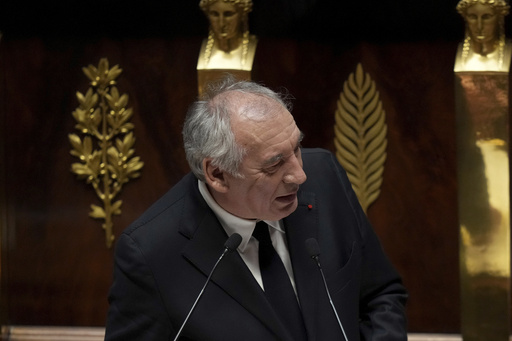PARIS — On Monday, French Prime Minister Francois Bayrou activated special executive authority to approve the nation’s 2025 budget without a parliamentary vote, putting the stability of his newly established government, just six weeks old, at risk amid an impending no-confidence motion.
Opposition groups are anticipated to submit the no-confidence motion later in the day, with a vote scheduled in the National Assembly for Wednesday.
This situation could either facilitate France’s budget approval or plunge the country back into political and economic disarray. Bayrou’s continuation as prime minister hinges on the level of support he garners from various political parties, as he represents the fourth individual to hold the prime ministerial office in a little over a year.
The current political climate in France is critical not only for the nation but also for Europe as a whole. Following President Emmanuel Macron’s decision to call early elections last year, no political party secured a parliamentary majority, leading to significant instability in French politics. With France being one of the largest economies globally, the inability to finalize a budget has raised concerns among investors and posed challenges for the 20-nation eurozone.
Pressure is further compounded by the European Union’s demands for France to tackle its sizeable debt and deficit. This predicament comes at a particularly challenging time for Macron amid external threats, such as U.S. President Donald Trump’s potential imposition of new tariffs on the EU and Russia’s increasing assertiveness in Ukraine.
During weekly discussions, French lawmakers engaged in deliberations about the conclusions drawn by a joint Parliamentary committee regarding the state budget. The prior government collapsed due to budget considerations which involved slashing 40 billion euros in spending and increasing taxes by 20 billion euros. Bayrou’s altered proposal appears to have attempted to alleviate opposition concerns.
The joint committee has retained a surcharge on large firms while opting to elevate a financial transaction tax. Moreover, Bayrou has agreed to maintain 4,000 jobs in national education, reversing earlier plans for cuts. Despite these adjustments, opposition parties have deemed the changes inadequate. Consequently, with no majority support in the National Assembly, Bayrou invoked a little-used constitutional provision, Article 49.3, allowing the government to enact legislation without a parliamentary vote, which is seldom applied to budget matters.
The far-left party, France Unbowed, announced it would pursue a no-confidence motion in response to Bayrou’s actions.
For the no-confidence motion to succeed, it needs backing from at least half of the 577 Assembly members. While France Unbowed can count on the support of Communist and Green lawmakers, this coalition alone is insufficient. The Socialist Party’s vote could prove crucial in this scenario. On Monday, the Socialists indicated they would abstain from voting against Bayrou’s government, stating that “it’s time to give France a budget”. However, dissent among individual lawmakers may occur, complicating the situation further.
Meanwhile, Marine Le Pen, the leader of the far-right National Rally, played a significant role in ensuring the previous government’s ousting. Her party currently holds the largest single faction in the lower house of parliament and has announced that it will issue guidance to its members on how to vote on Wednesday.
If Bayrou is removed from office, President Macron will be tasked once again with selecting a new prime minister and assembling a government capable of securing a consensus on the budget.
This predicament echoes previous events; in December, a confidence motion borne from budget disagreements led to the resignation of conservative Prime Minister Michel Barnier. Barnier had been appointed to resolve the political stalemate following last year’s elections, but his austerity budget only deepened factional divides. Following that, Macron appointed the centrist Bayrou, hoping he could ameliorate these divisions. Unlike Barnier, Bayrou has engaged in extensive negotiations with the Socialist Party, striving to establish a non-aggression agreement on the budget whereby each party refrains from undermining the other.



